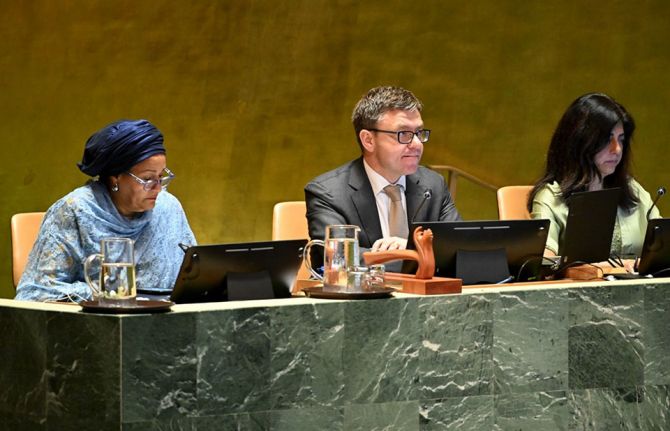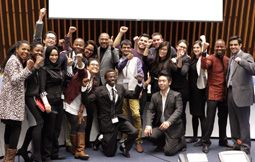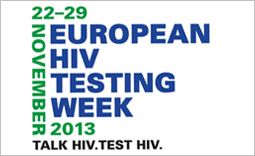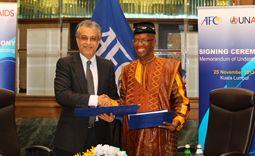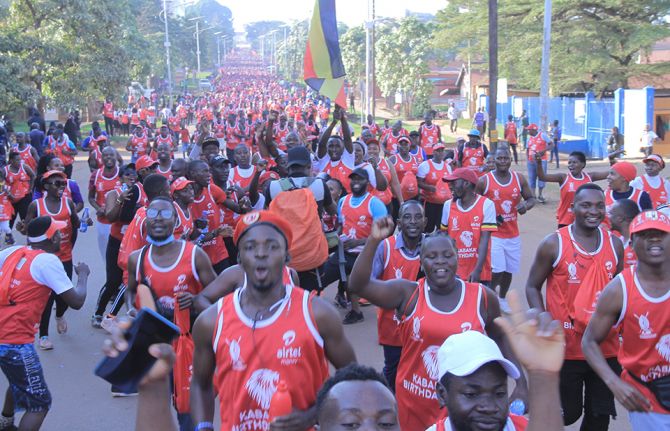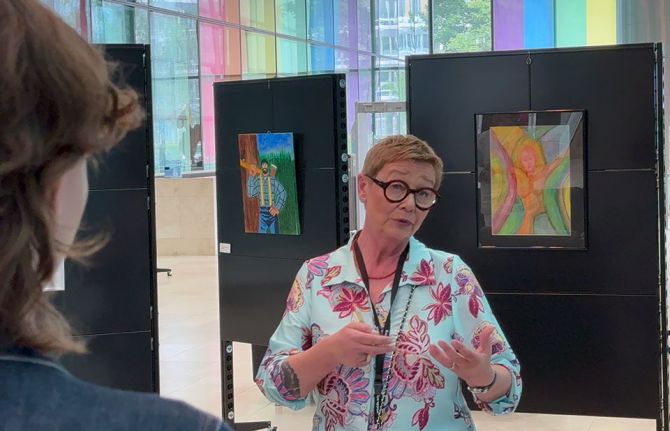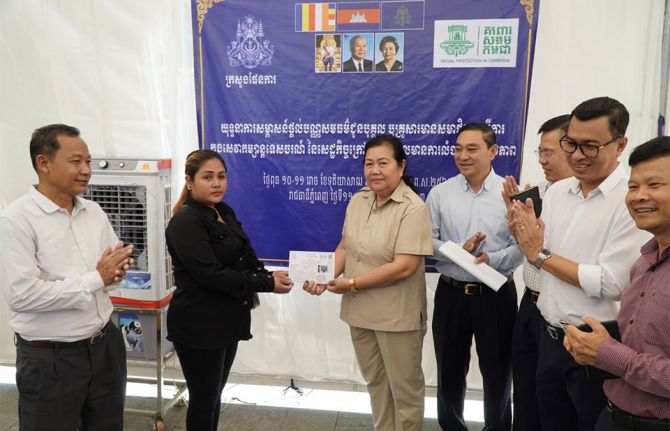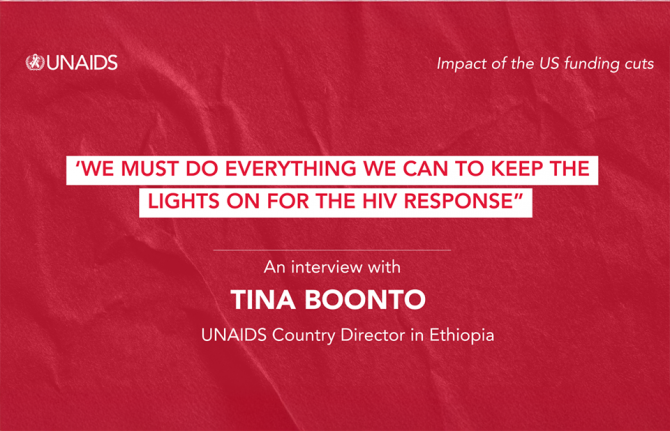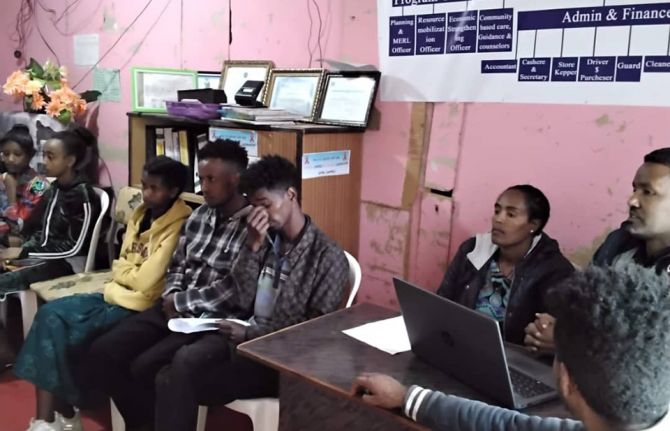
Feature Story
UNAIDS Executive Director celebrates World AIDS Day in South Africa
01 December 2008
01 December 2008 01 December 2008
Deputy President of South Africa, Baleka Mbete and UNAIDS Executive Director Dr Peter Piot Credit: UNAIDS/D. Penney
Dr Peter Piot, Executive Director of UNAIDS, is marking the 20th World AIDS Day at a ceremony in Durban, together with South Africa’s Deputy President, Ms Baleka Mbete and South African Health Minister Barbara Hogan.
The World AIDS Day programme is taking place at the SAHARA Kingsmead stadium, where national and global leaders came together to commemorate the event under the theme of “Stop HIV & AIDS: Leadership and Unity”. As one of his last official engagements as Executive Director of UNAIDS, Dr Piot joined high level representatives from national government, civil society and other partner organizations to demonstrate support and commitment to the national AIDS response.
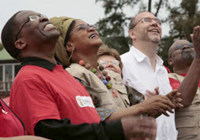
UNAIDS Executive Director Peter Piot with members of South African government and civil society at the World AIDS Day event in Durban South Africa. Credit: UNAIDS/D. Penney
“It is only through working together to tackle the challenges of this epidemic that we can make progress,” said Dr Piot. “Success depends on strong leadership united under a shared vision. The theme of Leadership and Unity chosen by South Africa is a powerful tool that helps bring together the many sectors and resources needed to make progress against HIV and AIDS.”
Earlier in the day, Dr Piot participated in a live television discussion hosted by the South African Broadcasting Corporation alongside the Deputy President, the Minister of Health and a civil society representative living with HIV.
The HIV epidemic in South Africa
South Africa has the largest number of HIV positive people in the world with some 5.7 million people live with HIV in the country. With nearly half a million people receiving antiretroviral treatment, South Africa also has the largest antiretroviral treatment programme in the world.
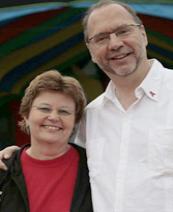
UNAIDS Executive Director Dr Peter Piot and South Africa Minister of Health, Barbara Hogan Credit: UNAIDS/D. Penney
The severity of the epidemic in southern Africa underscores the need for intensified and accelerated action towards universal access to HIV prevention, treatment, care and support, as nine countries in the region account for 35 per cent of all HIV infections in 2007. UNAIDS has identified HIV prevention as a particular priority and is highlighting the need for countries in the region to accelerate their focus on the need to reduce HIV incidence through combination prevention. By “knowing your epidemic and knowing your response” countries can better design and implement tailored prevention programmes that are evidence informed. Combination strategies include education and raising awareness in relation to delaying early sexual debut and increasing condom use.
South Africa will come to a standstill at noon for 15 minutes on World AIDS Day in a workplace stoppage initiative by the South African National Aids Council. The aim is to strengthen and sustain unity, partnership and leadership in response to HIV. South Africans will pause to pause to consider their personal role in the AIDS response: “Have I tested for HIV? If not, why not? Have I talked to my family and children about preventing HIV? If not, why not? Do I understand about HIV medicines and how they work? How can I stop discrimination?”
Former President Nelson Mandela, President Kgalema Motlanthe, his Deputy Baleka Mbete, Health Minister Barbara Hogan, COSATU President Zwelinzima Vavi, Archbishop Desmond Tutu and Dr Piot, are among those supporting the workplace stoppage HIV awareness campaign.
UNAIDS Executive Director celebrates World AIDS D
Press centre:
UNAIDS supports World AIDS Day commemoration in South Africa (27 November 2008)
Mr Michel Sidibé appointed UNAIDS Executive Director (01 December 2008)
Multimedia:
World AIDS Day Message from UNAIDS Executive Director Dr Peter Piot, 1 December 2008
View photo gallery
%Speeches:
Speech by Peter Piot, UNAIDS Executive Director at World AIDS Day event, Durban, 01 December 2008
Publications:
Related

Feature Story
UNAIDS welcomes Mrs Carla Bruni-Sarkozy’s Ambassador role for Global Fund
01 December 2008
01 December 2008 01 December 2008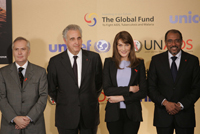
(from left) Associate Director of UNICEF’s Programme Partnerships, Pascal Villeneuve, Executive Director of the Global Fund, Michel Kazatchkine, Mrs Bruni-Sarkozy, UNAIDS Deputy Executive Director Michel Sidibé. Credit: élysée Palace
Mrs Carla Bruni-Sarkozy today took up her appointment as Ambassador for the Protection of Mothers and Children against HIV/AIDS of the Global Fund to Fight AIDS, Tuberculosis and Malaria (the Global Fund) at an event in Paris.
Mrs Carla Bruni-Sarkozy began her new mission on this the 20th anniversary of World AIDS Day, signing a letter of agreement with Executive Director of the Global Fund, Michel Kazatchkine. UNAIDS Deputy Executive Director Michel Sidibé and the Associate Director of UNICEF’s Programme Partnerships, Pascal Villeneuve were also present and signed a statement offering their full support for this new partnership.
Mr Sidibé spoke of the significance of Mrs Carla Bruni-Sarkozy’s appointment, “I know that Madam Ambassador will help raise the voices of mothers and their families around the world who are affected by AIDS.”
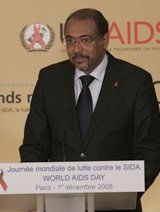
Mr Sidibé spoke of the significance of Mrs Carla Bruni-Sarkozy’s appointment, “I know that Madam Ambassador will help raise the voices of mothers and their families around the world who are affected by AIDS.” Credit: élysée Palace
“Madame Ambassador, thank you for your commitment. Your leadership will help build bridges across communities in France and abroad,” said Sidibé.
This evening Mr Sidibé will attend a World AIDS Day event at Musée de l'Homme hosted by the President of France Nicolas Sarkozy which includes a book launch and multimedia exhibition organized by Magnum Photos and the Global Fund. Tribute will be paid to Nobel Prize winner Françoise Barré-Sinoussi.
Earlier today the United Nations Secretary-General Ban Ki-moon announced the appointment of Mr Sidibé as the next Executive Director of the Joint United Nations Programme on HIV/AIDS (UNAIDS).
UNAIDS welcomes Mrs Carla Bruni-Sarkozy’s Ambassa
Cosponsors:
Partners:
The Global fund to Fight AIDS, TB and Malaria
Press centre:
Mr Michel Sidibé appointed UNAIDS Executive Director (01 December 2008)
UNAIDS commends HIV scientists for Nobel Prize win (06 October 2008)
Multimedia:
Speeches:
Read remarks by Mr Michel Sidibe, Deputy Executive Director of UNAIDS, World AIDS Day 2008. (pdf, 96 Kb)
Related
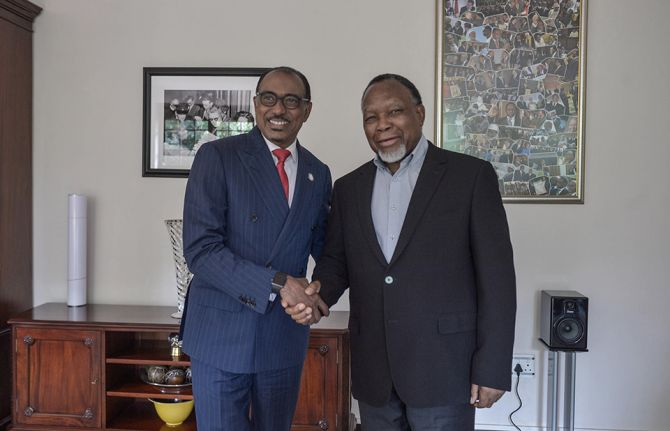 Keeping up the momentum in the global AIDS response
Keeping up the momentum in the global AIDS response

24 April 2019
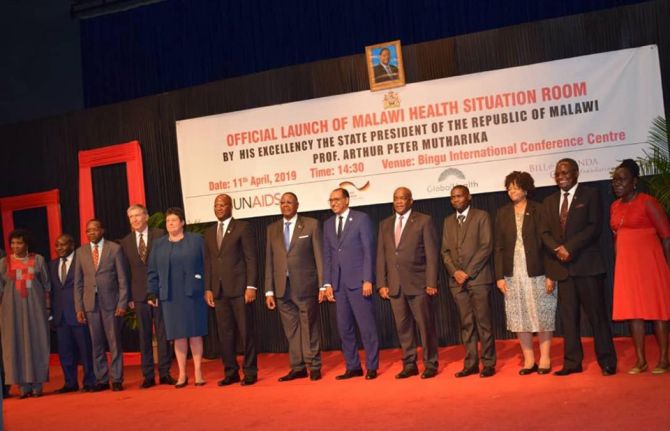 Malawi launches its health situation room
Malawi launches its health situation room

12 April 2019
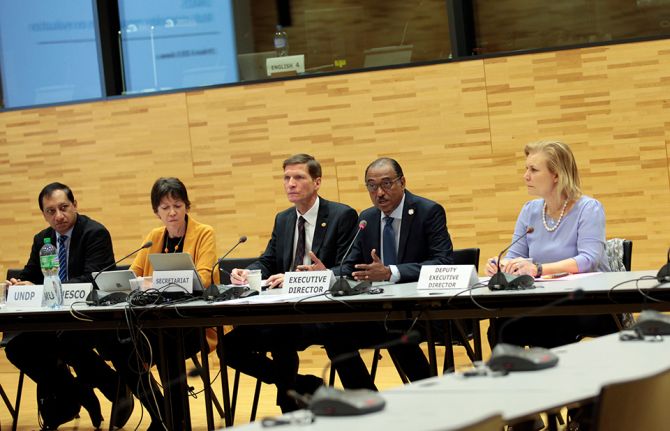 Learning lessons on evaluation
Learning lessons on evaluation

02 April 2019

Feature Story
World AIDS Day marked at Doha conference
01 December 2008
01 December 2008 01 December 2008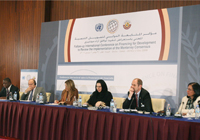
Press conference held on World AIDS Day 2008, Doha, Qatar
Government, international, civil society and private sector leaders have gathered in Qatar's capital, Doha, to take stock of the implementation of the 2002 Monterey Consensus on financing for development. The “Follow-up International Conference on financing for Development to Review the Implementation of the Monterrey Consensus” is taking place against a backdrop of global financial uncertainty. Officially inaugurated on Saturday, the conference runs until 2 December.
To mark the occasion of today’s 20th World AIDS Day, at the plenary meeting in Doha, UN Secretary-General Ban Ki-moon delivered a World AIDS Day statement in which he announced the appointment of Mr. Michel Sidibe as the new UNAIDS Executive Director.
The Secretary-General’s statement was followed by a press conference moderated by Mariangela Bavicchi-Lerner, UNAIDS Chief of Donor Relations.
The panel was composed of:
- Ms. Luisa Morgantini, Vice President of the European Parliament
- H.E. Trevor Manuel, Minister of Finance, Republic of South Africa and Special Envoy of the Secretary-General for Doha Review Conference
- H.E. Majozi V. Sithole, MP and Minister of Finance, Kingdom of Swaziland
- Dr. Laila Isharair, Health and Social Planning Advisor, Qatar General Secretariat for Development Planning, and member of the Qatar National AIDS Committee
- Dr. Christoph Benn, Director of External Relations and Partnerships, The Global Fund to fight AIDS, TB and malaria
- Dr. Renu Chahil-Graf UNAIDS Regional Director for the Middle East and North Africa
The Minister of Finance, Republic of South Africa and Special Envoy of the Secretary-General for Doha Review Conference Trevor Manuel emphasized the need on this day to remember the AIDS response.
“This is a financing conference for development and it is important to remind people of the challenges of HIV on 1 December,” he said.
Dr. Renu Chahil-Graf UNAIDS Regional Director for the Middle East and North Africa highlighted the status of the epidemic in the Region and noted the positive efforts made to-date which need to be replicated in other countries.
The Vice-Chair of the European Parliament emphasized the support and commitment of Europe and its institutions to the AIDS response and the Global Fund to fight AIDS, Tuberculosis and Malaria reminded the audience about the challenges ahead in view of reaching Universal Access.
Panelists also expressed their appreciation for the work of outgoing UNAIDS Executive Director Dr Piot and congratulated Mr Michel Sidibé on his appointment.
World AIDS Day marked at Doha conference

Feature Story
2008 World AIDS Day statements
30 November 2008
30 November 2008 30 November 20081 December 2008 marks the 20th anniversary of World AIDS Day.
This year’s theme is “Lead – Empower – Deliver" Designating leadership as the theme provides an opportunity to highlight both political leadership and celebrate leadership that has been witnessed at all levels of society. To mark the day, the United Nations Secretary General, the Executive Director of UNAIDS and UNAIDS Cosponsors and partners speak out in special World AIDS Day statements.
|
United Nations Secretary General, |
|
|
Press play to start |
|
|
"We have to end the stigma and discrimination that still stop so many people from learning how to prevent HIV and get treatment. And we need resources -- enough to provide services that will have a real impact in communities and on entire nations. The need to lead, empower and deliver on AIDS is as real and urgent as ever." Read the UN Secretary General's message |
|
|
|
|
|
UNAIDS Executive Director |
|
|
Press play to start |
|
|
"Let’s not forget that AIDS is not over anywhere. Indeed, on World AIDS Day 2008, there are as many reasons for concern as for celebration." Read the UNAIDS Executive Director's message |
|
Other World AIDS Day messages: |
|
 |
WHO Director-General Message for World AIDS Day, 1 December 2008 “This year, which marks the 20th anniversary of World AIDS Day, also marks a major milestone in the long struggle against this disease. Well over 3 million people in low- and middle-income countries are now receiving life-prolonging antiretroviral therapy. Such an achievement was unthinkable 20 years ago, when the world was just beginning to comprehend the significance of this disease and its catastrophic impact on individuals, families, and societies.” |
|
|
|
 |
UNDP Administrator Message for World AIDS Day, 1 December 2008 “Tackling this epidemic remains a top priority for UNDP. With strong leadership, by empowering people living with HIV, and by delivering on the promises that have already been made, there is real hope that we can turn the tide against AIDS.” |
|
|
|
 |
Head of UNHCR's Division of Operational Services Message for World AIDS Day, 1 December 2008 "UNHCR's HIV and AIDS programmes have come a long way, HIV remains one of the policy priorities of the High Commissioner [for Refugees António Guterres] and protection remains the cornerstone of UNHCR's HIV and AIDS strategy. Today, we have reached nearly 100 percent coverage in universal precautions in health clinics in refugee camps and safe blood supply to refugees; [while] access to programmes for prevention of mother-to-child transmission increased to more than 60 percent." Read the full message |
|
|
|
 |
UNODC Executive Director Message for World AIDS Day, 1 December 2008 Today, we mark the 20th anniversary of the World AIDS Day. Long ago, we pledged to "keep the promise" but we have not. AIDS is still with us. Among the estimated 16 million people injecting drugs worldwide, one in five will likely contract HIV. Is "AIDS fatigue" setting in as other global problems compete for attention? United Nations Secretary-General Ban Ki-Moon has declared that the challenge is to sustain leadership in this fight. Without strong and committed leadership, we will fail. Read the full message |
|
|
|
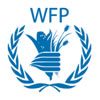 |
World Food Programme "Good nutrition is vital for the health and survival of all people, but it is particularly important for people with HIV/AIDS. In combination with clean water, hygiene and care, nutritious food helps people stay healthier longer, and improves the impact of anti-retroviral drug treatment." Read more |
|
|
|
 |
Director-General of UNESCO “The world is, at last, making some real progress in its response to AIDS, confirmed in the UNAIDS 2008 Report on the global AIDS epidemic.” Read the full statement |
|
|
|
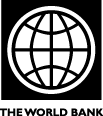 |
The World Bank Today, with some 33 million people living with HIV, World AIDS Day and events like the International Conference on AIDS and STIs in Africa, taking place in Senegal, December 3-7, remain “extraordinarily important for those who are trying to fight AIDS in this world,” says Shanta Devarajan, Chief Economist for the World Bank’s Africa region. Read the full message |
|
|
|
 |
Director-General of ILO “On this World AIDS Day, the ILO recommits to making work and workplaces key avenues for responding to the challenge of HIV/AIDS. The last Global AIDS Report showed signs of progress in the battle against the epidemic. This is encouraging – we know that with concerted action we can beat it.” Read the full statement |
|
|
|
 |
UNFPA Executive Director “Today, as we commemorate the 20th anniversary of World AIDS Day, we pay tribute to the leaders in communities and nations who have promoted greater awareness and action to address the AIDS pandemic. If there is one lesson learned over the years, it is that success in responding to the HIV epidemic requires sustained leadership, community engagement and the involvement of people living with HIV.” Read the UNFPA Executive Director's message |
|
|
|
 |
UNICEF Chief of HIV/AIDS “We are making real progress in terms of prevention of mother-to-child transmission of HIV and of treatment of young people, but at the same time there is a huge amount that needs to be done.” Read the full message |
|
|
|
 |
UN High Commissioner for Human Rights "This year, we mark both the 20th World AIDS Day and the 60th Anniversary of the Universal Declaration of Human Rights. It is fitting that during these landmark anniversaries we consider how far we have come in the global effort to combat AIDS." Read the full statement |
|
|
|
 |
UNIFEM Executive Director Ms. Inés Alberdi Message on the occasion of World AIDS Day, 1 December 2008 "Imagine a world where every woman who needs treatment, whether young or old, gets it; where women in all countries are allowed to inherit equally with men — in practice as well as in law; where women in all countries are aware about their rights to prevention, treatment and care, and are empowered to claim these rights; where HIV-positive women are shaping the policies that affect their lives and making decisions on policy priorities and budgets." Read full statement |
|
|
|
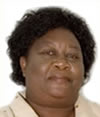 |
Special Envoy of the Secretary-General for AIDS in Africa “World AIDS day should not just be a reminder of the horrible situation HIV and AIDS has created in the world and in particular sub Saharan Africa, but it should also be a day for applauding the progress that we have made so far.” Read the full statement |
|
|
|
 |
Special Envoy of the Secretary-General for AIDS in Eastern Europe and Central Asia “Leadership has been important all from the beginning of the AIDS epidemic; initially from activists, scientists and public health leaders against ignorant and indifferent politicians and authorities. When the World AIDS Day was initiated in 1988. President Kenneth Kaunda was among the few politicians who exerted leadership by declaring that his son had died of AIDS. This has improved since then; awareness has increased and denial is less common. Unfortunately, twenty years later we are still awaiting empowerment of women and marginalized groups and in my work as Special Envoy I am shocked to meet with medieval discriminatory attitudes among leaders in different areas in politics, religion, education and not the least among doctors and nurses , those who should instead lead the fight against discrimination. This must be changed! “ Lars Kallings, UN SG Special Envoy on HIV and AIDS for Eastern Europe” |
|
|
|
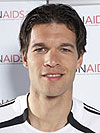 |
UNAIDS Goodwill Representative “As an athlete, I compete on the field. But off the field, we must team up and unite in the struggle against AIDS. There are no second chances when you are playing with your life. On this day, the 20th anniversary of World Aids Day, I urge you to make AIDS your business and unite with your peers and join us in being smart and helping protect ourselves as well as others. ” |
|
|
|
|
UNAIDS Special Representative "On December 1, 2008 we will mark the 20th anniversary of World AIDS Day. As more and more people are globally connected to each other through technology, sharing the power of a good idea can help bring about transformational change on our planet rapidly. As a UNAIDS Goodwill Ambassador, I pledge my continuing support to help raise awareness and to shine a light on all the unsung heroes and organisations who have joined UNAIDS to "Lead, Empower and Deliver" the world to an HIV/AIDS free future. Together we can provide hope, knowledge, treatment and compassion to all people living with HIV." |
|
|
|
|
 |
UNAIDS Special Representative "We need national and global leaders to fulfil their commitment to secure universal access to prevention, treatment and care. But today, 26 year after the virus was discovered, we also need to secure leadership for the future. Youth leadership is a key factor in the fight against AIDS. We need youth to follow up and intensify the efforts to stop and reverse the spread of HIV. In my AIDS related work, I meet remarkable young people who have the energy, courage and stamina to address sensitive issues – and to put pressure on those in power. Still, most important of all: We must give voice to those who are affected, and empower more of them to take leadership. They are the most important contributors in the fight against AIDS. What I have learned about this issue, I have mostly learned from positive people. It is their voices, experience and their expertise we need for sustainable and lasting change. I will encourage leaders on all levels to seek broad partnership and join forces. Only then can we truly lead, empower – and deliver.” |
|
|
|
 _ _ |
Executive Director, The Global Fund to Fight AIDS, Tuberculosis and Malaria “Twenty years after the first World AIDS Day, we have come a long way. Leadership at both the international and national levels has generated the resources to build treatment and prevention programs that are saving lives and showing evidence of impact on the disease. Millions of people have benefited thanks to these efforts. However, the latest UNAIDS report on the global AIDS epidemic shows that HIV/AIDS is still a major health burden. We must all continue our work to prevent the disease from spreading further, to make sure that people living with AIDS have access to treatment and care and to ensure that resources are available to deliver on the promises of the international community” |
|
|
|
 _ _ |
The World AIDS Campaign The 1st of December, World AIDS Day, is the day when individuals and organisations from around the world come together to bring attention to the global AIDS epidemic. 2008 marks the 20th anniversary of World AIDS Day. Whilst we have come a long ways since 1988, there is still much more to be done. More World AIDS Campaign resources and World AIDS Day events around the world |
|
|
|
 _ _ |
UN Plus “Today is 1 December the day when communities around the world commemorate World AIDS Day. For many individuals and organizations this day is a rare occasion to reflect upon how HIV and AIDS has affected the world around them, their lives and that of their loved ones. For those of us in UN Plus, the group of United Nations staff living with HIV, our positive status means that this type of reflection is something that takes place every day of the year - not just on 1 December.” Read the full statement |
|
|
|
 _ _ |
The Archbishop of Canterbury, Dr Rowan Williams “Our hope and our prayer today is that the excellent work that’s done, not just in developing countries but here at home too by the Churches will continue and deepen and be strengthened by our prayer and our commitment. Recognising that people living with HIV is us not them, whether it’s leaders and congregations, congregations and ’outsiders’ - it’s us. It’s all of our business...Church leaders and Church congregations taking responsibility for educating the wider public.” Watch the video |
|
|
|
 _ _ |
The Global Business Coalition on HIV/AIDS, Tuberculosis and Malaria CEOs from leading Coalition member companies are striking a blow against discrimination and stigma this World AIDS Day, by signing the Coalition’s HIV/AIDS nondiscrimination pledge. Ending stigma is fundamental to winning the fight against HIV/AIDS. Read the pledge |
|
|
|
 _ _ |
The World Evangelical Alliance (WEA) WEA's General Assembly received and affirmed the Call to Action in an overwhelming vote on October 29, 2008. Bishop Gerry Seale, General Secretary of the Evangelical Association of the Caribbean, has agreed to lead a small task force to recommend how WEA can implement the Call to Action. Representatives from Asia, Africa and the Americas will be joined on the task force by Rev. Patricia Sawo of ANERELA+ (the African Network of Religious Leaders Living With and Personally Affected by HIV) and Sally Smith (UNAIDS). The task force is expected to complete its recommendations by June 30, 2009. Read full text of the Call to Action |
|
|
|
 _ _ |
World YWCA The World YWCA joins the global community in commemorating 20 years since the first World AIDS Day was observed. Although progress has been made in responding to HIV and AIDS, the challenges remain complex. Some countries have managed to lower infection rates, but progress remains uneven, as these successes are off set by increases in new infections in other regions. Today, the overall number of people living with HIV has increased, more women and children are at risk of infection, and stigma and discrimination continues to create barriers to an effective response. Read full statement |
|
|
|
 |
Ecumenical Advocacy Alliance World AIDS Day, observed on 1 December each year, is a unique opportunity when governments, national AIDS programs, faith organizations, community organizations, and individuals around the world come together to bring attention to the global AIDS epidemic. On World AIDS Day each of us can reflect on the ways HIV and AIDS affects us personally, how it affects our local communities and country, and how we can respond to the global pandemic. You have an important part to play on that day through planning or participating in events at your church, your school, and in your community. Read full statement |
|
|
|
 _ _ |
International Community of Women Living with HIV/AIDS As the theme of this year's World AIDS Day is focusing on leadership, we at ICW are proud to introduce a series of interviews conducted with HIV positive women from across the world, many of whom are ICW members. |
|
|
|
 _ _ |
President of American Jewish World Service "Today, the frontline of the AIDS movement is global and diverse - as are the many challenges we are confronting. AIDS carries a history of stigma and social discrimination that we must transcend if we are to respond to the pandemic with solidarity, support and compassion for the infected and affected among us. Faith communities have a special capacity to address the social barriers that have thus far prevented fully effective responses to the AIDS pandemic. Read the full statementMore on the American Jewish World Service |
|
|
|
 _ _ |
President of Caritas Internationalis “Greater leadership on HIV is still needed as we mark the 20th anniversary of World AIDS Day. Despite some progress, HIV is a major obstacle to achieving the Millennium Development Goals. The pandemic causes incalculable human suffering. It threatens the social and economic infrastructure of the human family. More needs to be done. Read the full statement |
|
|
|
 _ _ |
Islamic Relief Worldwide Islamic Relief South Africa joins the South African National AIDS Council (SANAC) in calling upon all to mobilise to stop the spread of the HIV epidemic. Join the world in UNIFIED action using 15 minutes (12h00 to 12h15) on World AIDS Day, Monday 1 December 2008. Read the full statementMore on Islamic Relief Worldwide |
|
|
|
 _ _ |
Archbishop Desmond Tutu "AIDS fight requires resources, even in tough times. As we prepare to commemorate World AIDS Day on Monday, we must remember that the world is facing not only an AIDS emergency, which is killing 5,500 people a day, but also the global spread of tuberculosis, including drug-resistant strains." Read the full statement |
|
|
|
 _ _ |
International Federation of Medical Students Association Today, medical students globally are joining hands, raising their voices in unity and standing together in the fight against the spread of HIV/AIDS. Read the full statement (pdf, 281 Kb) |
2008 World AIDS Day statements
Related

Feature Story
Michael Ballack online UNAIDS competition closes
29 November 2008
29 November 2008 29 November 2008
Today, on 20th anniversary of World AIDS Day, the UNAIDS competition featuring superstar football player and UNAIDS Special Representative Michael Ballack has come to a close.
Contestants sent in answers from all corners of the globe, from countries including Russia, Botswana, China, and Brazil, just to name a few. The draw has taken place and lucky winners will soon be receiving t-shirts, courtesy of Ballack clothing. Stay tuned for more competitions and prizes in the future!
The correct answers:
Question 1:
Name any two cosponsors of UNAIDS
Answer 1.
Any two of the following were acceptable:
Office of the United Nations High Commissioner for Refugees (UNHCR)
United Nations Childrens Fund (UNICEF)
World Food Programme (WFP)
United Nations Development Programme (UNDP)
United Nations Population Fund (UNFPA)
United Nations Office on Drugs and Crime (UNODC)
International Labour Organization
United Nations Educational, Scientific, and Cultural Organization (UNESCO)
World Health Organization (WHO)
World Bank
Question 2:
What is UNAIDS Goodwill Ambassador Michael Ballack saying about prevention?
Answer 2:
“Be Smart, Protect yourself!!”
Michael Ballack online UNAIDS competition closes
Feature stories:
Be a winner with Michael Ballack and UNAIDS online competition (20 October 2008)
Related

Feature Story
On the record: Interview with Dr Peter Piot, founding Executive Director of UNAIDS
28 November 2008
28 November 2008 28 November 2008Looking ahead – “Get up, stand up, don’t give up the fight”

Photo:UNAIDS/ Girardin
At the end of 2008, Dr Peter Piot, the founding Executive Director of UNAIDS, will leave his post after leading the organization since his appointment in 1994. He reflected on past milestones and future challenges in an interview with John Donnelly:
How are you feeling on the eve of your departure?
Peter Piot: I thought my last couple of months would be pretty quiet. (Laughs) I underestimated that a bit. But my main objective has been to secure our funding for next year. That is always a challenge.
When you look back on your time at UNAIDS, what do you consider the three biggest breakthroughs?
PP: The first one came in 1996, when treatment was discovered and became available, and equally important to that was the major reduction in the price of antiretrovirals later. They are both very important milestones.
The second one was the UN General Assembly Special Session on HIV/AIDS in 2001. That was a turning point. After that, the Global Fund (to Fight AIDS, Tuberculosis and Malaria) was created; presidents and prime ministers took charge of the response in many countries; AIDS made it to the top of the agenda in the world. It was no longer just an issue for ministers of health. It was discussed in places where you discuss the really big issues.
And the third thing, I guess, is that the fact that the money we spent last year on AIDS reached US$ 10 billion. It’s a formidable resource mobilization. A really important part of that is the major role of people living with HIV. Money is the result of the combination of this activism and the political work symbolized in the General Assembly session.
Can you describe a moment when you received epidemiological data that scared you?
PP: Many of them. My most recent experience was when I saw the data recently on the rise in HIV in the gay populations in Asia. It was exactly what we saw in the West in the early 1980s. I saw the same thing with injecting drug users in Eastern Europe about 10 years ago. And when I was working in central Africa, in then Zaire, in the mid-1980s, South Africa had less than 2% prevalence. Then, a few years later, you saw it skyrocketing, and say, ‘Wow. That’s unbelievable.’ There have been many moments like this. It’s something that I think we should bear in mind when we think of the future of this epidemic. The virus will continue to surprise us. That’s why I’m very sceptical when people say about Asia, ‘Oh, it will be limited to concentrated populations.’ Maybe, maybe not. We don’t know.
Has the fight against AIDS strengthened or weakened health systems?
PP: There’s absolutely no evidence that I’ve seen that it undermines health services. If anything, it certainly strengthened certain services, such as laboratories. Determined governments will make sure that disease specific funding is used to strengthen local capacity. The AIDS epidemic itself has overburdened health systems. It also for the first time has brought money to strengthen the health workforce in, say, Malawi where they even built health clinics with AIDS funds. Ethiopia is another example. They have a strong government and a strong minister of health. He has been using AIDS funds to build rural health clinics. But let’s also not forget that if we had waited until the health services were fixed before introducing antiretroviral therapy, as so many suggested, we would still be nowhere on ART and millions would have died.
What concerns you most about the response to the epidemic today?
PP: What really concerns me is that while we’ve made measurable progress on access to treatment, we don’t have the same impact when it comes to HIV prevention. Is it because we need more time, or are we not on the right track? I personally think more and more that we need to be working with the professionals who do the marketing for branding businesses, who know how to influence people’s behaviors. HIV prevention is what will require the extra shot in the arm.
You’ve identified a US$ 10 billion annual shortfall in the fight against AIDS. What’s your best argument to increase funding?
PP: The number one argument is that funding for AIDS works, is saving lives, and has shown high return on investments. The needs are there. Just take treatment—close to 4 million are now on antiretrovirals today, but still about 8 million need it. Also, we are so far better equipped to spend the money before. Initially, systems had to be developed, labs established, people trained. Delivering the goods is now cheaper because we have made the initial investments.
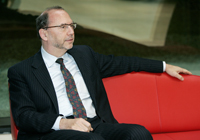
Photo:UNAIDS/ Girardin
PP: If there’s a decline in funding, the return on the investment will be much less. Postponing action just increases the bill later on. I worry now that governments will cut the social sector
first. That is often the experience in economic downturns. In Japan, after their financial crisis in 1990, they cut development assistance by 60%. And without ODA, without The Global Fund, the
heavily AIDS-affected and poorest countries won’t be able to run their AIDS programmes.
In developing countries, governments may have less income. They may have fewer remittances, less private direct investments. That means more people will be vulnerable, and could lead to an increase in sex work. We don’t know this will happen. But it’s something I’m very concerned about.
You often describe yourself as an activist. What is your grade for activists over the past several years? Where have they succeeded? Failed?
PP: I think activists have been hugely successful in terms of treatment, advocacy, and mobilizing funds, particularly for The Global Fund. That’s a top grade. But as for activists working for prevention,
well, Treatment Action Campaign in South Africa is doing it, but they are an exception.
How do you take politics out of the prevention debates?
PP: It’s not possible—and there’s nothing wrong with that. It’s about fundamental choices in society and life. Thinking that we could have a society that is completely rational about these 12 things is an illusion and may not be good. … You need to have a set of values and principles guiding policies, and then you automatically get into politics with AIDS. The key is to make sure it is good politics, the politics where as much as possible that if there is scientific evidence, that evidence is used to save lives. There are still countries where harm reduction in working with drug users is against the law. That’s bad politics.
What’s going to be especially hard in prevention work ahead?
PP: In Asia and Eastern Europe, we have to start looking beyond sex workers and drug users, and how it could make inroads in the general population. And secondly, in an increasing number of eastern and southern African countries, up to half of all infections are occurring in stable couples. How do we deal with that? That calls for a revision in our approaches. In addition we need help from business to professionalize HIV prevention.
What will be the role of the modes of transmission studies that show where the new infections are likely to occur?
PP: They should be very helpful because we don’t always know what is going on. We may be basing our prevention work on where the epidemic was five years ago. It may have changed, or may not have changed. My concern is not only that we have good studies, but the studies are used. In Lesotho, similar studies led to changes. In Thailand, they are trying to change the prevention approach based on new information, and in China, the studies are drawing attention to homosexual men. Most difficult will be in countries with generalized epidemics—how to interpret the information. If HIV is in married or stable couples, boy, that’s quite a lot of people, and how do you do that?
In your speech at the International AIDS Conference in Mexico City, you quoted Bob Marley’s lyrics,“Get up, stand up, don’t give up the fight”. Then you said, “That’s what I will do. What will you do?”
PP: I don’t know yet. I’ll be in an academic position at Imperial College in London, United Kingdom, and will continue some work in AIDS, but as a citizen and member of the community.
I need some time now to work on my next life. But I definitely want to work across disciplines. Like Bob Marley said, ‘We’ve got a mind of our own’”.
On the record: Interview with Dr Peter Piot, foun
Press centre:
New HIV incidence analyses helps sharpen prevention efforts (28 November 2008)
Download printable version (pdf, 36.1 kb)
Feature stories:
The Lancet: Series on HIV prevention launched (06 August 2008)
Publications:
AIDS Outlook (pdf, 608 Kb)
2008 Report on the global AIDS epidemic
Related

Feature Story
UNAIDS launches “AIDS Outlook”
28 November 2008
28 November 2008 28 November 2008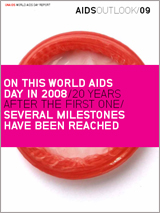
AIDS Outlook is a new report from UNAIDS that provides perspectives on some of the most pressing issues that will confront policymakers and leaders as they respond to the challenges presented by AIDS in 2009.
AIDS Outlook is a new report from UNAIDS that provides perspectives on some of the most pressing issues that will confront policymakers and leaders as they respond to the challenges presented by AIDS in 2009. In many ways the year ahead will be a year of transition—and acceleration. Many countries are reviewing their national strategies on AIDS. Even though political commitment for AIDS is at an all-time high, recent developments in the financial world will test the resilience of many.
This report is an opportunity for reflection. Reflection on what it has been possible to achieve with leadership as well as for refocusing on some key areas that are impeding progress. It is not a “how to manual” or a “policy statement”, but provides insights based on evidence on new ways to build on and improve the AIDS response.
The report begins by highlighting some recent achievements and challenges in addressing HIV. It provides examples of how countries are applying modelling techniques to better understand HIV incidence, with the aim of reinvigorating HIV prevention. AIDS Outlook concludes with an introduction to combination HIV prevention and its application.
AIDS Outlook relies upon both estimates of HIV prevalence and impact from data collected from around the world—as well as perspectives from those responding to AIDS in countries and communities. Joining data with instrumental voices will help to identify the debates needed and decisions required for countries as they plan their future strategies.
The report also includes an interview with UNAIDS Executive Director Dr Peter Piot where, on the eve of his departure after 14 years as head of the organization, he reflects on past milestones and future challenges of the AIDS epidemic.
UNAIDS launches “AIDS Outlook”
Press centre:
New HIV incidence analyses helps sharpen prevention efforts (28 November 2008)
Download printable version (pdf, 36.1 kb)
Feature stories:
The Lancet: Series on HIV prevention launched (06 August 2008)
Multimedia:
View photo gallery
Listen to UNAIDS Director of Evidence, Monitoring and Policy
Publications:
AIDS Outlook (pdf, 608 Kb)
2008 Report on the global AIDS epidemic
Related

Feature Story
“Art for AIDS” receives Keith Haring sculptures
27 November 2008
27 November 2008 27 November 2008
Ahead of World AIDS Day 2008, two sculptures by Keith Haring have come to UNAIDS to join the “Art for AIDS” collection. Credit: UNAIDS
Ahead of World AIDS Day 2008, two sculptures by Keith Haring have come to UNAIDS to join the “Art for AIDS” collection. His iconic and poignant work has been instrumental in raising awareness around AIDS issues worldwide.
The UNAIDS headquarters building in Geneva received on Wednesday two new additions to its “ART for AIDS” collection. The artworks are two sculptures by the celebrated artist and AIDS activist Keith Haring which have been loaned to UNAIDS by the Keith Haring Foundation.
In his all-too-brief lifetime, Keith Haring (1958-1990) produced artwork at a prodigious rate and reached a worldwide audience that transcended differences of race, nationality, gender, age, and sexual orientation. He used his now iconic symbols— the barking dog, radiant baby, dancing person and the heart—to encourage reflection on and dialogue about social and political issues.
The humanist elements of his work allowed him to communicate on virtually universal terms. As a result, Haring used his designs for many public and social awareness campaigns, including AIDS prevention, literacy, UNICEF children's causes, and the fight against South African apartheid.

Haring enlisted his imagery during the last years of his life to generate activism and awareness about AIDS. Credit: UNAIDS
Haring was diagnosed with HIV in 1988. In 1989, he established the Keith Haring Foundation, whose mandate is to provide funding and imagery to AIDS organizations and children’s programmes, and to expand the audience for Haring’s work through exhibitions, publications and the licensing of his images. Haring enlisted his imagery during the last years of his life to speak about his own illness and generate activism and awareness about AIDS.
Although his art had always reflected his social consciousness, in Haring's last years many of his works were devoted to creating cultural awareness about HIV and gay rights issues.
The UNAIDS’ Art for AIDS is an art collection created to recognize the role art has played in the response to AIDS. The pieces in the collection have been chosen to provoke thought and dialogue around some of the most difficult issues around AIDS. With an initial emphasis on contemporary African art, the collection has grown to more than 60 museum quality pieces thanks to the involvement of artists, collectors and donors around the world.
“Art for AIDS” receives Keith Haring sculptures
External links:

Feature Story
The impact of nutrition and HIV: World Food Programme
26 November 2008
26 November 2008 26 November 2008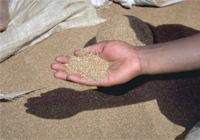
Credit: UNAIDS/ L. Alyanak
The World Food Programme (WFP) is the lead UN agency providing emergency food assistance and the world's largest humanitarian agency. As a cosponsor of UNAIDS it also plays a unique and significant role in the global AIDS response. In 2007, WFP reached 1.3 million people affected by HIV in 20 of the 25 highest HIV prevalence countries.
For a person living with HIV to respond well to antiretroviral treatment, access to adequate food is essential. WFP was one of the first agencies to provide food to complement the expansion of people’s access to HIV treatment. Last year, WFP supported treatment programmes in 16 African countries, providing food support to over 332,000 beneficiaries during the critical early stages of treatment.
High Food Prices
With high food prices jeopardizing household food security of some of the most vulnerable people in the world, the importance of WFP’s nutritional response for people living with HIV and their families has never been more urgent. A recent pilot study from Zambia showed that food supplementation improved treatment adherence and there is growing evidence from various countries that health clinic attendance has decreased as food prices increase.
UNAIDS and WFP
WFP’s lead role in dietary and nutritional support in the UNAIDS Division of Labour (DoL) involve leadership in the delivery of food assistance and nutritional support and in enhancing national actions through advocacy, guidance and technical support.
WFP is central to efforts to scale up HIV services for populations of humanitarian concern, and it has been integrating HIV treatment and support with inter-agency emergency preparedness, response and recovery activities in Latin America, the Caribbean and Africa. Many different food products are being developed and tested to improve the health and well-being of people on HIV treatment. WFP’s is involved in providing support to scientific studies on the efficacy of specially formulated food products for the nutritional needs of people living with HIV.
Unique contribution at national level
WFP works through national governments and local partners to provide food and nutritional assistance to food insecure people living with HIV and their families. This can make a big difference to a household when the main breadwinner is too ill to work. It also provides in-school meals for orphans and other children affected by HIV. It also provides technical assistance to national governments to ensure that people living with HIV have access to appropriate nutritional food to accompany their treatment and the Programme ensures that people living with HIV link to community support mechanisms to help ensure longer-term livelihood survival.
WFP and “responsible transport”
WFP works with private sector companies that employ thousands of truck drivers to transport food and goods to people in need. However throughout Southern Africa, high prevalence rates of HIV are found along the commercial transport corridors and the World Food Programme, taking its corporate responsibility seriously, wishes to minimize the risks of HIV infection.
In the past year, WFP has improved its HIV prevention and health services for transport workers under its commitment to support “responsible transport”. The project helps to protect the health and well-being of transporters and the local communities they come in contact with along the way. The wellness centre pilot project in Malawi, supported by WFP and TNT, has grown into an independent non-profit alliance called North Star Foundation (NSF) that includes UNAIDS and the International Transport Workers Federation as partners. Five NSF wellness centres are now operating – two in Malawi, one in Namibia, one in Swaziland and one in Zambia; two more in Zimbabwe will open in 2008. NSF will work with Family Health International to set up 23 wellness centres in eight east African countries over the next three years.
Country offices in Benin, Chad, the Democratic Republic of Congo, Ethiopia, The Gambia, Kenya and Niger have worked with United Nations and NGO partners to provide HIV training, improved access to health services and enhanced workplace HIV policies for transport workers.
New Guidance Materials Produced by WFP
In response to requests from country offices for detailed guidance on HIV programming, several guidance tools have recently produced. These are linked on right of the page under “Tools”.
Future Directions
WFP can help advance the debate on and deepen understanding of the nutritional needs of people living with HIV and their family members, working together with the cosponsors by advocating with major funding mechanisms such as PEPFAR and the Global Fund. WFP can help ensure that national and community-level HIV and AIDS programmes, especially treatment programmes, include gender-responsive nutritional components. WFP can also support and promote scientific studies that look at the efficacy of specially formulated foods for the nutritional needs of PLHIV.
The impact of nutrition and HIV: World Food Progr
Cosponsors:
Press centre:
WFP becomes ninth Cosponsor of UNAIDS (16 October 2003)
Feature stories:
New UNAIDS policy on HIV, food security and nutrition (21 May 2008)
AIDS, nutrition and food security (28 November 2007)
External links:
North Star Foundation
International Transport Workers' Federation
Tools:
Food Assistance Programming in the Context of HIV (WFP, 2007)
Food Assistance in the Context of HIV: Ration Design Guide (WFP, 2008)
Publications:
UNAIDS/WFP/WHO Policy Brief – HIV, food security and nutrition (pdf, 247 Kb)
Hunger, health and HIV/AIDS: a critical connection
Full matrix of the UNAIDS Division of Labour (gif, 141 Kb)
UNAIDS Technical Support Division of Labour: Summary & Rationale (pdf, 403 Kb)
Related

Feature Story
Translating intent into action in Ethiopia
25 November 2008
25 November 2008 25 November 2008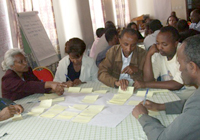
The Ethiopian Business Coalition against HIV/AIDS (EBCA), GTZ Engineering Capacity Building Program, the World Bank Institute and the Rapid Results Institute implemented a pilot programme to achieve rapid HIV results within businesses in Ethiopia in 100 days.
Implementing ambitious long-term HIV programmes in the workplace can be a daunting undertaking for a business. In Ethiopia, partners have piloted a management tool designed to restructure policies into a series of short-term goals and produce concrete results quickly.
The Ethiopian Business Coalition against HIV/AIDS (EBCA), GTZ Engineering Capacity Building Program, the World Bank Institute and the Rapid Results Institute implemented a pilot programme to achieve rapid HIV results within businesses in Ethiopia in 100 days.
In March and April 2008, 180 staff from twelve companies, together with six members of EBCA, attended workshops in “Rapid Results Approach” (RRA) for their business HIV programmes. The trainings gave the company teams—management and employees—an opportunity to identify HIV focus areas, set ambitious targets and develop work plans.
Tadesse Tekallign of Crown Cork and Can Share Company is in no doubt about the value of the initiative. “The pilot project is creating new best practices on HIV in Ethiopia’s private sector.” “The companies are finding their own solutions and tackling challenges quickly to produce very effective results,” Tekallign continued.
Achieving their goals
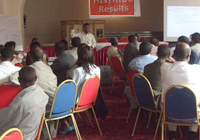
In March and April 2008, 180 staff from twelve companies, together with six members of EBCA, attended workshops in “Rapid Results Approach” (RRA) for their business HIV programmes.
In the three months following the training EBCA gave outreach support to the companies by regular telephone calls, weekly meetings and assistance with setting up partnerships with non governmental organizations and associations who could provide services to the companies.
The companies’ team commitment was impressive and progress substantial. All companies reached, and exceeded, their goals within the time period.
|
Ten companies in Ethiopia took part in the 2008 pilot programme and their goals for the following 100 days were: Alkyd Resin Share Company Crown Cork and Can Share Company East Africa Holding Company Emergency Relief Transport Kaliti Construction Kaliti Metal Mugher Cement Prefabricated Building Parts Production Enterprise Total Ethiopia |
Sustainability
Following the completion of the pilot, a workshop on experience-sharing and sustainability was held for all companies who had participated. EBCA is continuing its follow up and technical support to ensure companies continue their HIV programme implementation.
Next round
EBCA, together with the African Capacity Building Foundation, the World Bank Institute and the Rapid Results Institute have recently launched the second round of Rapid Results in 10 additional Ethiopian companies:
- Coffee Processing
- Comet Transport
- Ethiopian Electric Power Corporation
- Faffa Food Share Company
- Kokeb Flour and Pastas
- National Alcohol and Liquor
- National Mining
- National Motor Corporation
- Nyala Insurance
Rapid Results Approach (RRA)
The Rapid Results Approach (RRA) is a management tool designed to give quick and meaningful results within 100 days or less. By focussing on results it aims to jumpstart major change efforts and assist implementation. RRA is based on the belief that the best way to build capacity is to provide people with real-time support while they work to achieve an ambitious short-term goal that is of critical importance to the organization.
In addition to achieving short-term results and teaching people how to work together, the approach aims to create grassroots capacity to carry out large-scale, complicated changes. It can help companies take their most challenging long-term HIV/AIDS projects and restructure them into a series of short-term initiatives that produce real results quickly. The approach also offers business leaders a new set of skills and expertise in coaching, team building and achieving measurable results quickly.
“UNAIDS is very happy to support the Rapid Results Initiative in Ethiopia. This approach of formulating an action plan with a sharpened focus on producing early results, can be a great model for the private sector and can help engage them better in the AIDS response," said Regina Castillo, Chief Private Sector Partnerships, UNAIDS.
The approach has also been used successfully in HIV and reproductive health programmes in Kenya, Sierra Leone and Madagascar.
Translating intent into action in Ethiopia
Feature stories:
Business coalitions from Latin America and the Caribbean gather in Brazil (13 October 2008)
UN Secretary-General convenes pharmaceutical companies in New York (09 October 2008)
The Life Initiative – Hotels addressing AIDS (23 July 2008)






